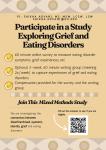Grief and Eating Disorders: A Decolonial Perspective
By Shikha Advani
This past year, I launched a community-engaged research project exploring the intersection of grief and eating disorders through a decolonial lens. Eating disorders are often studied through an individual and biomedical framework, but this misses the broader sociopolitical and historical forces that shape how people experience body image, food, and healing. My project aimed to create space for narratives that highlight grief as both a personal and collective experience, particularly for communities most impacted by systemic oppression.
The project had two parts. First, 152 people completed a survey examining eating disorder severity, grief experiences, and sociopolitical attitudes. Second, I facilitated a qualitative writing group with 10 participants who engaged in guided writing prompts and dialogue about grief, identity, and food. Both components were designed to center marginalized voices and explore how disenfranchised grief, including grief tied to racism, colonialism, fatphobia, disability, and other structural oppressions, relates to eating disorders.
This work would not have been possible without the support of my faculty mentors and community collaborators, who provided guidance on culturally responsive methods and helped ensure the project was grounded in collective values rather than extractive research. The participants themselves were also co-creators of knowledge, sharing stories, reflections, and insights that will inform both scholarship and clinical practice.
Through this process, I learned several key lessons. First, participants emphasized that grief is not just about individual loss but also about systemic conditions such as generational trauma, displacement, and the loss of cultural food practices. Second, community-centered methodologies, like the writing groups, fostered healing alongside research. Many participants described the groups as validating and liberating, showing that research can itself be a site of care. Finally, the project reminded me of the importance of reflexivity: as a researcher, I must continually reflect on my own positionality and how my privileges shape both the questions I ask and the knowledge I produce.
The outcomes of this project extend beyond data collection. The findings will contribute to my dissertation and future publications, but they also create pathways for clinical and community interventions that validate grief as central to eating disorder recovery. Most importantly, participants left with a sense that their experiences matter and can reshape how the field understands and responds to eating disorders.
This project affirmed that when research is rooted in collaboration, cultural humility, and justice, it not only generates knowledge, it creates impact in people’s lives.
